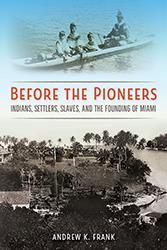Before the Pioneers
Indians, Settlers, Slaves, and the Founding of Miami
Andrew K. Frank
Hardcover: $35.00
Paper: $16.95
Paper: $16.95
- Series: Florida in Focus
“A beautifully written and thoroughly researched study of Miami. Essential.”—Choice
“[An] incisive study of Miami.”—Journal of American Ethnic History
"In addition to helping fill a historiographic void, Frank provides much to consider in relation to other treatments of Florida’s past. . . . Before the Pioneers should serve as the starting point for future studies of the issues [Frank] references, and it clearly demonstrates that south Florida existed as a vibrant human hub long before the advent of Miami.”—Journal of American History
“A remarkable study of the five eras of human occupation of the Miami River’s north bank before the 1896 inception of the city of Miami. . . . An excellent book that fills a much-needed void in Florida history.”—Hispanic American Historical Review
“In this riveting account, Frank moves beyond stories of recent development to uncover the deep history of a place profoundly shaped by mound-builders, slaves, raiders, and traders. This book will change the way you think about Florida history.”—Christina Snyder, author of Slavery in Indian Country: The Changing Face of Captivity in Early America
“A marvelous read that offers new perspectives on old history.”—Jerald T. Milanich, author of Florida Indians and the Invasion from Europe
“Reveals that Old Miami seems a lot like New Miami: a place bursting with energy and desperation, fresh faces, and ancient dreams.”—Gary R. Mormino, author of Land of Sunshine, State of Dreams: A Social History of Modern Florida
“A deep, intelligent look at the parade of peoples who dotted the north bank of the Miami River for thousands of years before Miami’s modern era.”—Paul S. George, author of Along the Miami River
“A masterful history. A must-read for anyone who wants to learn about Miami.”—Arva Moore Parks, author of George Merrick, Son of the South Wind
Formed seemingly out of steel, glass, and concrete, with millions of residents from around the globe, Miami has ancient roots that can be hard to imagine today. Before the Pioneers takes readers back through forgotten eras to the stories of the people who shaped the land along the Miami River long before most modern histories of the city begin.
Andrew Frank begins the chronicle of the Magic City’s long history 4,000 years ago when Tequesta Indians settled at the mouth of the river, erecting burial mounds, ceremonial centers, and villages. They created a network of constructed and natural waterways through the Everglades and trade routes to the distant Calusa on the west coast. Centuries later, the area became a stopover for Spanish colonists on their way to Havana, a haven where they could shelter from storms and obtain freshwater, lumber, and other supplies. Frank brings to life the vibrant colonies of fugitives and seafarers that formed on the shores of Biscayne Bay in the eighteenth century. He tells of the emergence of the tropical fruit plantations and the accompanying enslaved communities, as well as the military occupation during the Seminole Wars. Eventually, the small seaport town flourished with the coming of “pioneers” like Julia Tuttle and Henry Flagler who promoted the city as a place of luxury and brought new waves of residents from the North.
Frank pieces together the material culture and the historical record of the Miami River to re-create the fascinating past of one of the world’s most influential cities.
Andrew K. Frank is the Allen Morris Associate Professor of History at Florida State University. He is the author of several books, including Creeks and Southerners: Biculturalism on the Early American Frontier.
A volume in the series Florida in Focus, edited by Frederick R. Davis and Andrew K. Frank
- Sample Chapter(s):
- Press Kit
- Excerpt
- Table of Contents
A beautifully written and thoroughly researched study of Miami. Essential.
--Choice
Tells the previously untold history of the North Bank. . . . Will be popular with both scholars and the general public.
--H-Net












